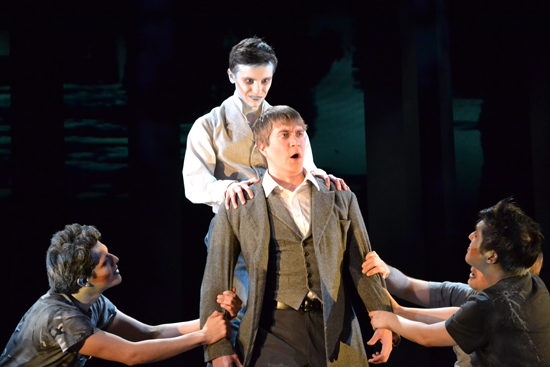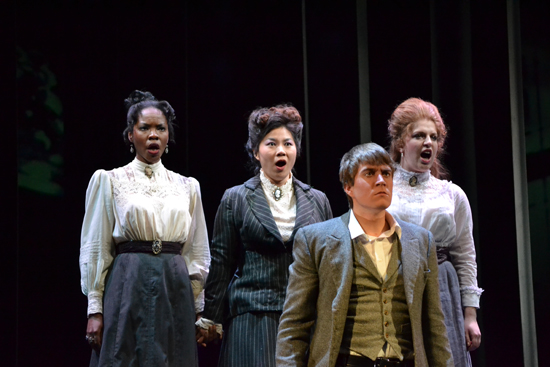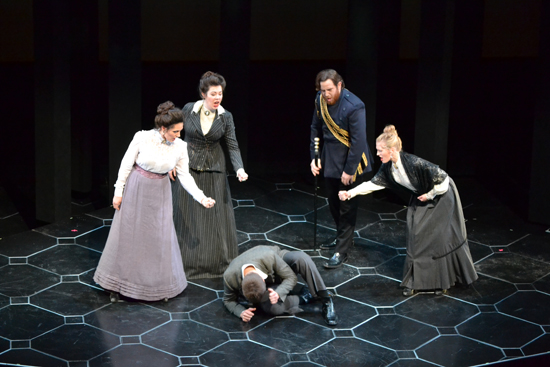CFA Stages a Compelling Cry for Peace
Boston premiere of Britten’s Gothic opera Owen Wingrave

Jorgeandres Camargo (CFA’14) (from left), John Slack (CFA’14), Isaac Bray (CFA’14), Heejae Kim (CFA’14), and Peter Brown (CFA‘15) perform in the College of Fine Arts production of the Benjamin Britten opera Owen Wingrave, which opens tonight at the BU Theatre. Photos by Oshin Gregorian
Benjamin Britten’s rarely produced opera Owen Wingrave is a searing, tragic tale of an unlikely pacifist born into a family of soldiers. Britten, an avowed pacifist himself, was commissioned to write the work not for the stage, but for television, where it debuted in 1971 on Britain’s BBC2—a challenge for anyone staging the opera today, says Jim Petosa, stage director of the current production of the opera at the Boston University Theatre. The production takes the small screen narrative and interprets it in a way that “yields different riches on the large stage” of the theater, says Petosa. Playing tonight through Sunday, the collaboration between the College of Fine Arts School of Theatre and the Opera Institute marks the opera’s Boston premiere as well as the centennial of Britten’s birth.
Based on a short story by Henry James and written during the throes of the Vietnam War, Owen Wingrave was first performed live at the Royal Opera House at London’s Covent Garden in 1973. The opera swirls around Owen Wingrave’s efforts to avoid military service. The young Wingrave prefers peace to the brutal carnage of his military family and ancestors. “In peace I have found my image,” sings Wingrave, being played in alternating performances by baritones Nickoli Strommer (CFA’14) and Isaac Bray (CFA’14). Cast out by his family and his lover, who accuse him of cowardice, Wingrave is locked on a dare in the haunted bedroom of his ancestral home, where the ghosts of his forebears Colonel Wingrave and his son (who in his day also refused to fight, and was killed by the colonel) are said to roam. There Owen meets his tragic end.

“Taking the conventional realistic style of television drama and applying it to opera must have been fascinating for the original interpreters, but our challenge is different,” says Petosa, director of the School of Theatre and a CFA professor. “Its roots in the James short story give it certain Gothic aspects that we’re employing to full effect, and we’re exploring an almost ritualized staging of the narrative as a way inside its spirit.”
William Lumpkin, a CFA associate professor of music and acting director of the Opera Institute, is the opera’s music director and conductor. “I believe the antiwar message is timeless,” Lumpkin says, “but more generally, I believe the prevalent message is the courage it takes to be at peace with one’s deeply held personal beliefs, whether it be about war, religion, sexuality, politics, and so on.”
The percussion-rich score by Britten, composer of the moving War Requiem, a mass for the dead based partly on the poems of Wilfred Owen, who was killed in World War I, reflects his forays into 12-tone serialism, a chromatic technique coined by early 20th-century Austrian composer Arnold Schoenberg.
“One could argue that Britten’s unique adaptation of the Viennese 12-tone technique was a subversive reaction to the more mainstream British style his teachers attempted to instill throughout his formative years,” says Lumpkin. “How perfect then, that we find Britten’s ‘tonal atonal’ technique as the basis for the opera Owen Wingrave, a tale of an individual who rejects the ancestral heritage being forced upon him.”

Petosa says he hopes this provocative opera will “find its way into the brain and heart of the audience in new and compelling ways.” With America’s post-9/11 perspective on war and military service having changed and grown more complex than it was in the Vietnam era, he says, he believes that Owen Wingrave “turns the key on a new way of thinking about war, that finds it intolerable. And his fight for peace reflects a challenge that makes more conventional warfare pale.”
Owen Wingrave runs tonight, Thursday, February 21, through Saturday, February 23, at 7:30 p.m., and Sunday, February 24, at 2 p.m. at the Boston University Theatre, 264 Huntington Ave., Boston. Tickets are $20 for the general public, $15 for BU alumni, WBUR and WGBH members, Huntington Theatre Company subscribers, and senior citizens, $5 for students with valid ID; free admission with military ID. Two free tickets with BU ID at the door on the day of performance, subject to availability. Purchase tickets here or call 617-933-8600.
Comments & Discussion
Boston University moderates comments to facilitate an informed, substantive, civil conversation. Abusive, profane, self-promotional, misleading, incoherent or off-topic comments will be rejected. Moderators are staffed during regular business hours (EST) and can only accept comments written in English. Statistics or facts must include a citation or a link to the citation.